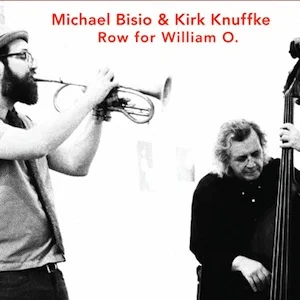Label: ESP-Disk, 2025
Personnel - Eunhye Jeong: piano; Michael Bisio: bass; Joe McPhee: tenor saxophone; Jay Rosen: drums.
Bassist Michael Bisio, a cornerstone of the Matthew Shipp Trio, expressed interest in collaborating with Korean pianist Eunhye Jeong after hearing her solo album Nolda (ESP-Disk, 2021). Jeong, in turn, found a true kindred spirit in Bisio, who brought in two distinguished guests—saxophonist Joe McPhee and drummer Jay Rosen—to join them on select tracks. Drawn to dynamic tension, the musicians craft a richly layered and collectively improvised set of music.
The duo effort “Point Expands the World” unfolds with immense timbral beauty and refined interplay. Jeong and Bisio share a contrapuntal ingenuity, their symbiotic connection evident in the blues-infused pianistic intricacies and occasional arpeggiated grace, matched by Bisio’s entrancing, nuanced bass work. They frequently return to a point (a single repeated note) from which their improvisations expand and evolve.
The duo’s remarkable, uncanny fluency is extended to dark canvas such as “And Then She Was There”, an off-kilter piece marked by a mix of arco expressionism and impressionistic abstraction, and enigmatic piano chords. “Dusts Into Substantiality” strays from jazz orthodoxy, embracing percussive volatility before plunging into agitated avant-garde corners with swift, invigorating gestures. Both musicians revel in the moment, and communicate it.
“Drinking Galactic Waters” introduces Rosen’s soft brushwork and McPhee’s reflective tenor saxophone in a very jazzy setting with plenty of room to create. Gradually, the saxophonist takes over, steering his bandmates into turbulent waters, though the final section softens into melodic introspection. The full quartet comes together again for “Morning Bells Whistle Bright”, which opens with percussive textures, continuous bass whistling, and sparse piano accents. After four minutes, McPhee enters in dialogue with the bowed bass, before Bisio locks into a seven-beat groove, weaving a compelling tapestry for improvisation. McPhee shines here, channeling elements of Coltrane, Ayler, and Ornette Coleman with fertile imagination.
The album’s duets extend beyond piano and bass. “Jaybird” pairs Jeong and Rosen, in an exchange of meaningful silences, sudden bursts, and stealthy movements. Meanwhile, “Superpreternatural” is a bass-and-drums breakdown brimming with perpetual tension, shaped by Bisio’s menacing bowed bass and Rosen’s incisive drum attacks.
A record of engrossing ideas, Morning Bells Whistle Bright, thrives on uncertainty and exploratory textures. The musicians’ strong personalities elevate it above the multitude of fully improvised albums recently released.
Favorite Tracks:
01 - Point Expands the World ► 05 - Drinking Galactic Waters ► 06 - Morning Bells Whistle Bright








